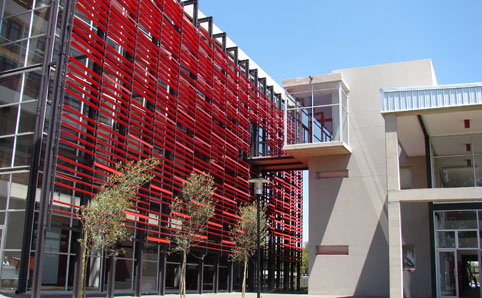 |
UFS Business School
Photo: Liezl Muller |
The UFS Business School was ranked amongst the top business schools in South Africa in a survey by Finweek and MBAConnect.net. MBAConnect.net is the biggest social network for MBA graduates in South Africa.
More than 10 000 MBA graduates and students were invited to take part in the survey and 1 575 of them completed it. More than half of the respondents are in senior or executive positions.
Prof. Helena van Zyl, the Director of the UFS Business School, says any business school has a moral obligation towards its alumni to ensure that the quality of the qualification that they obtained is maintained, that network opportunities are created for graduates, and that job opportunities are communicated, etc. Investment in and involvement with the alumni are non-negotiable as they form the backbone of a business school.
The UFS Business School’s results are listed below. The respondents rated the school as the school with the highest:
- percentage of respondents saying they had definitely made the right choice in doing an MBA: second with 92% (average 86%)
- score in leadership effectiveness: third with 8.9 (average 8.7)
- decision-making effectiveness: shares first place with 9.4 (average 9.1)
- credibility in business: second with 8.9 (average 8.6)
- impact of an MBA in changing industries: third with 8.3 (average 7.9)
- score for influence of an MBA in starting your own business: second with 8.5 (average 6.9)
- percentage of respondents saying an MBA was definitely worth the price paid: shares first place with 80% (average 72%)
- score for changing the outlook of students: shares first place with 9.3 (average 8.9)
- score for improving people’s views of their own potential: shares first place with 9.5 (average 9.1)
- score for helping people become better leaders in their personal lives: shares third place with 8.3 (average 7.8).
The UFS Business School shared first place with its alumni averaging the shortest payback period amongst those who thought the MBA was worth it. Its score was 1.1 years (average 1.8 years)
The report says across all schools, at least 73% of students report a negative impact on their stress levels. In the worst case, this goes up to 94%. The impact on the UFS’s students was the lowest at 18%. The average was 81%. At least a quarter of students in all schools report a negative impact on their health, and it goes up to 47% in the worst case. The UFS got 0 (nil) in the category for serious impact.
Alumni of the UFS Business School were very satisfied with the school. These results are as follows:
- Helps keep business knowledge up to date: third (6.5)
- Provides networking opportunities: first (7.3)
- Informs about business events: second (8.9)
- Communicates regularly: first (9.2)
- Helps access MBA-level jobs: second (6.2)
- Helps build personal brand: first (5.2)
- Helps start or grow business: first (5.2)